|
|
|
Sort Order |
|
|
|
Items / Page
|
|
|
|
|
|
|
| Srl | Item |
| 1 |
ID:
116497
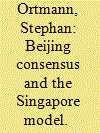

|
|
|
|
|
| Publication |
2012.
|
| Summary/Abstract |
What is today touted as the 'Beijing consensus' or the 'China model' is nothing more than a resized version of the 'Singapore model' or an attempt to revive the developmental state. In particular, the 'Beijing consensus' assumes a greater role for the state in the economy under authoritarian rule. Since Deng Xiaoping's Southern Tour in 1992, Chinese academics, politicians, and administrators have flocked to the soft-authoritarian city-state and the result has not only been a sprawling discourse but also a number of political reforms aimed at increasing the effectiveness of the state and strengthening one-party rule. An analysis of this discourse shows that while providing Chinese policy-makers with many important ideas, these studies reveal serious weaknesses in China's attempt to follow the 'Singapore model'. Instead of having found an alternative authoritarian state-capitalist model, the 'Beijing consensus' is only a transitory phase.
|
|
|
|
|
|
|
|
|
|
|
|
|
|
|
|
| 2 |
ID:
131355
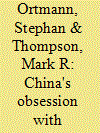

|
|
|
|
|
| Publication |
2014.
|
| Summary/Abstract |
Chinese government officials and academics have shown disproportionate interest in the small city-state of Singapore. The Southeast Asian country with a majority ethnic Chinese population has drawn their attention because it is the only country in the world that combines advanced industrial development with stable one-party rule. Singapore not only seemingly defies Western predictions that modernization will inevitably lead to democracy, but also appears to show that authoritarian regimes may be better suited to achieving societal stability in an Asian context. In particular, the ruling party of the city-state, the People's Action Party, has drawn the attention of conservative Chinese reformists who seek to fill the ideological void that emerged following the decline of Maoist ideology. Reformers in China also derive practical governance lessons from Singapore about fighting corruption, increasing professionalization, and improving responsiveness within the party-state. As such, political learning from the Singapore model must be seen as part of the ongoing process of transformation of the Chinese Communist Party. As a consequence of this learning process, Chinese reformers are using lessons from the Singaporean model as arguments in their efforts to bolster the ideological foundations and strengthen the governance capacity of one-party rule, thus reducing pressures for democratization.
|
|
|
|
|
|
|
|
|
|
|
|
|
|
|
|
| 3 |
ID:
167062
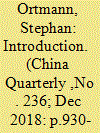

|
|
|
|
|
| Summary/Abstract |
This special section deals with China's longstanding fascination with Singapore's development experience that has preoccupied post-Maoist leaders from Deng Xiaoping to Xi Jinping despite the obvious differences between the tiny Southeast Asian city-state and the most populous country on earth. In particular, there is great Chinese interest in Singapore's success in combining effective governance and efficient state capitalism with stable one-party dominant rule. As a consequence, Chinese observers paid much less attention to electoral democracies that were well-governed states with mature economies.
|
|
|
|
|
|
|
|
|
|
|
|
|
|
|
|
| 4 |
ID:
093617
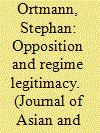

|
|
|
|
|
| Publication |
2010.
|
| Summary/Abstract |
This article seeks to understand the changing behavior of oppositional groups during socioeconomic changes using a comparative study of Singapore and Hong Kong. In order to better understand this process, three ideal typical phases are suggested. An almost complete lack of oppositional behavior characterizes the first phase, the 'colonial phase'. Second, the 'localization phase' occurs due to the increasing complexity of the political system and the need to become more responsive to the people. A major legitimacy crisis fundamentally changes the relationship between oppositional groups and the Government. In the 'decolonization phase', oppositional groups become mobilized and form coalitions to demand greater democratization.
|
|
|
|
|
|
|
|
|
|
|
|
|
|
|
|
| 5 |
ID:
179350


|
|
|
|
|
| Summary/Abstract |
This interpretive visual report interacts with repertoires of graffitied messages photographed at two university campuses in Hong Kong after skirmishes laced with tear gas and fire between students and riot police had ceased. This work is a response to several graffitied images taken in early 2020 after the campus siege of 2019. It is accompanied by a reference to the reverberations of recent watershed developments that have fundamentally changed Hong Kong society and the modern-day University's mission to establish coalescence amidst the diversity of ideas.
|
|
|
|
|
|
|
|
|
|
|
|
|
|
|
|
| 6 |
ID:
133769
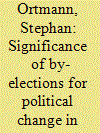

|
|
|
|
|
| Publication |
2014.
|
| Summary/Abstract |
By-elections in Singapore have played a different role depending on whether the country can be characterized as a hegemonic or competitive authoritarian regime. During the former, the ruling party was able to instrumentalize by-elections for leadership renewal and enhance its power. Conversely, they aided opposition parties as well, providing them a training ground.
|
|
|
|
|
|
|
|
|
|
|
|
|
|
|
|
| 7 |
ID:
137381
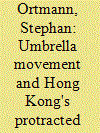

|
|
|
|
|
| Summary/Abstract |
The Umbrella Movement is the culmination of Hong Kong's protracted democratization process. This paper uses a historical perspective to explain the present situation. Students, which had been at the forefront of political activism in the 1970s, have yet again taken a leading role in the current movement. This has occurred as the democracy movement, which was buoyed by modest democratic reforms since the 1980s, has become deeply divided in recent years. Political parties of the pan-democratic camp, which played an important role in the 1990s, have been eclipsed by more assertive protest movements. The very slow progress of democratic reforms in Hong Kong is, however, due to the ruling elite. On the one hand, there is the authoritarian government in China which is worried about greater autonomy in its Special Administrative Region as well as potential spillover effects that could threaten one-party rule. At the same time, the powerful business elite in Hong Kong, Beijing's key ally, is worried that greater representative politics could lead to more substantial social redistribution.
|
|
|
|
|
|
|
|
|
|
|
|
|
|
|
|
|
|
|
|
|